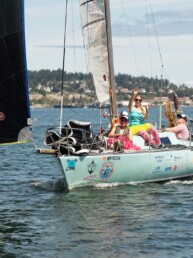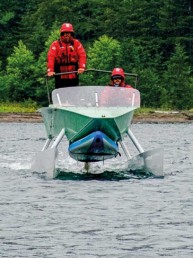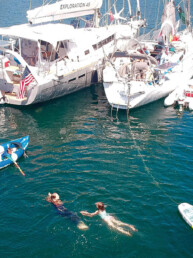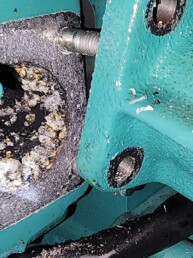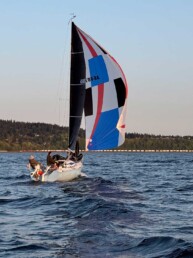From the April 2020 issue.
I’m hardly the first to row or sail the Inside Passage in a small craft. Yet, during the first 100 miles of my journey south from Port McNeil, Row Bird was the sole open boat on the water. Pulling into a harbor full of sailors who’d arrived on vastly larger keelboats and motor cruisers gave me a momentary sense of swagger.
Sometimes, though, I felt humbled. Like the day I tried to row against a fierce headwind into the ravine-like entrance to Háthayim Marine Park on Cortes Island. I’d comfortably made 14 miles earlier that day under sail and oar alone; but now, with each stroke, I gained only a few feet. Over the course of an hour, scores of boats with motors chugged by me as if I was standing still. I was starting to lose hope of making it another two miles to the tranquil bay at the top of the inlet, when a man in a dinghy motored up.
“I was watching you as I passed a while ago, and just one thought came to mind,” he said cheerfully. “You look knackered.”
He was right. I tossed him a line and, for the first (and last) time on the trip, I accepted a tow. When my new pal dropped me off a mile later, I stopped to see some big-boat friends already at anchor. They plied me with wine and fresh prawns in their toasty, comfortable cabin, where we traded tales of our routes through stunning mountains and endless forests. Later that evening, as I unrolled a sleeping bag on the floorboards of my boat, I was struck by how differently we were traveling through the same place.
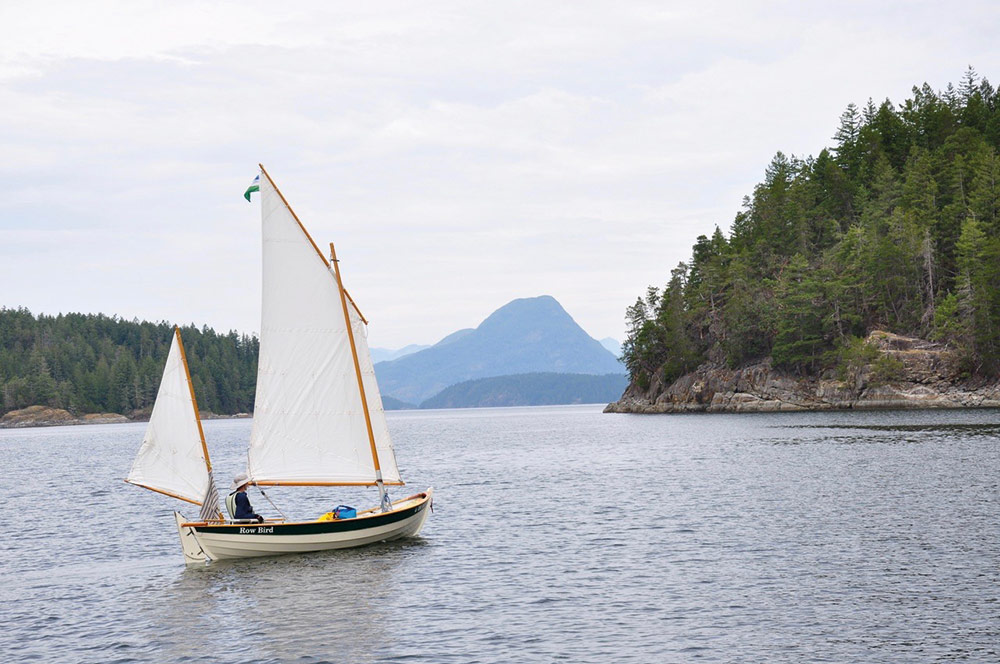
The next day, I ghosted out of the marine park and into the open waters of the Sutil Channel. The sun shone on a pod of massive humpback whales shooting spray overhead. More exciting to me was the appearance of a dozen little sails on the horizon. As I headed their way, I was momentarily becalmed. Rather than pulling out the oars, I just waited, enjoying the fleet’s familiar form skating across the sparkling water, and the utter quiet in the air. When the wind returned, I caught up with my clan.
The twenty-odd sailors were participants in the Barefoot Raid, a multi-day small-craft race—if you want to call it that—in which winning is less important than simply having fun sailing. This group skewed younger than the big boat crowd I’d met so far, plying motorless craft ranging from souped-up Hobie cats to a Whitehall-like rowboat with a tiny sprit sail. I felt right at home.
Come morning, I tagged along with the Raiders for a race. Fog and low clouds drifted across an informal starting line between tree-covered islands as the stillness was broken by sailors’ hooting and laughter. Sails were up as the race began, but thrashing oars and paddles were in constant motion, as each crew tried to gain a slight edge on the competition. Smiles broke out when the wind filled in, and sailors stowed their oars. Soon the boats had spread out so far that no semblance of a race could be detected. Also missing were committee boats and marks. For the raiders, it was all about the next destination—in this case, the dock at Squirrel Cove.
I found myself at the back of the pack, happily taking part in the loose conversations between boats. A few hours into the route, with a modest tail wind and lumpy water, I’d pulled away from everyone else. Then, through low clouds that periodically sprinkled me with dew, I noticed a change in the sea state—a current or wind line, I guessed.
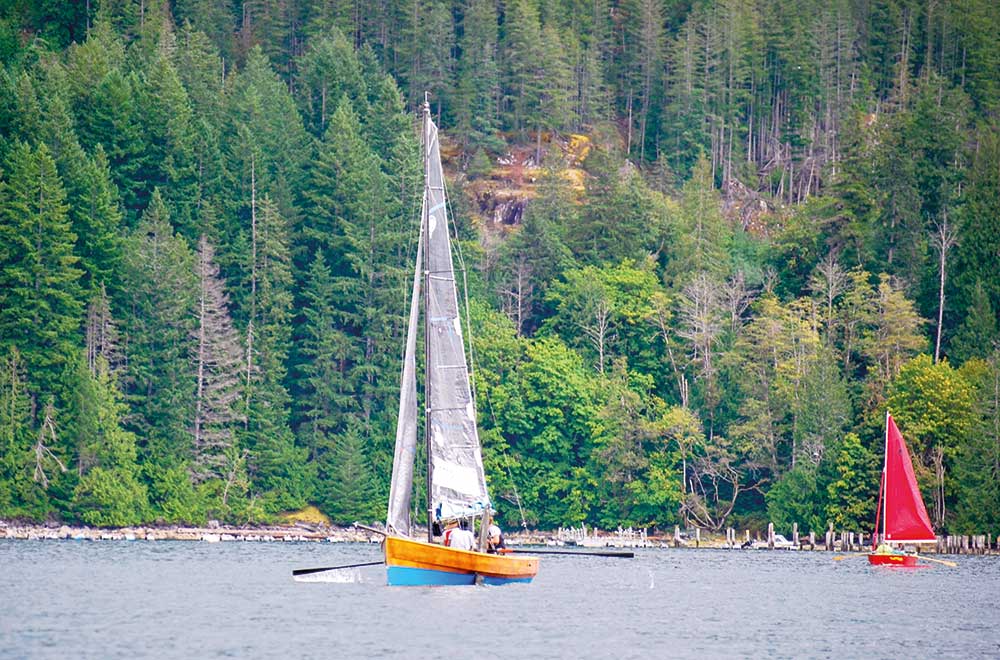
I approached the line, unsure what I was seeing. The water ahead was completely flat, but otherwise unmoving. Suddenly, huge droplets of ice-blue rain pummeled the surface—and me. I stood holding my tiller in awe, watching micro-explosions of rain batter the surface of the water, flattening the chop ahead, while the lumps remained just a few feet aft. The rain penetrated my hat almost instantly, a cold stream draining through my shirt and down my leg. Reflexively, I pulled the fly of my cockpit tent over my head and shoulders. After several minutes, the Biblical downpour showed no signs of abating; soon Row Bird had noticeably slowed, and rainwater was sloshing out of the bilge across my boots.
Then, just as suddenly as it had appeared, the storm dissipated, replaced by a light breeze and Squirrel Cove lay ahead. Dazed and excited, I steered into a bright patch near the government dock. As the last stragglers arrived, the day turned brilliantly sunny with blue skies. By some unspoken rule, we all assembled on the beach, where the lightest boats were hauled ashore. We basked, spread gear out to dry, and passed around afternoon drinks. The group dinner that night felt like a party, with people mingling in small groups, trading tales of the day, talking about their boats, and joshing each other about their positions in the race.
Come morning, the Raiders were heading west, while I was continuing south. As I watched the group recede around Cortes Island, I felt momentarily forlorn. They had welcomed me with generosity and kindness—just like the big boat sailors I’d encountered on my trip. Yet this leave-taking felt different. The Raiders were my own kind, sailors who revel in being close to the water, who live on the edge of capsize. With them, there was no need to explain my little sail-and-oar boat, or to feel like a curiosity here on the Inside Passage. We understood each other.
Bruce Bateau
Bruce Bateau sails and rows traditional boats with a modern twist in Portland, Ore. His stories and adventures can be found at www.terrapintales.wordpress.com

